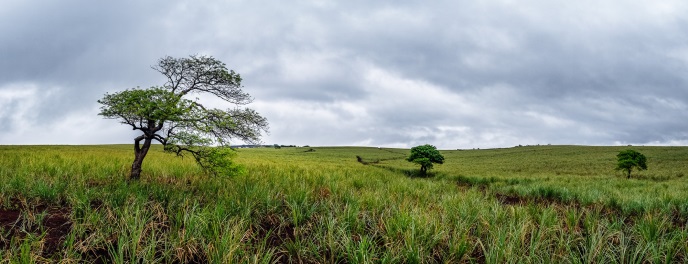
Bheki Sithole from rural Kwa-Zulu Natal used to be unemployed with little hope of change. Now a Project Manager at Simamisa Farming, Bheki says “Before the introduction of the project in 2014 life was a struggle. I did not know where the next meal for my family will come from. I was unemployed and it was challenging to educate my children”.
Tongaat Hulett Ltd operates in four districts of KZN: Ilembe, Uthungulu, Zululand, and Umkhanyakunde. The 2011 SA Census data paints a grim picture of these deep rural areas, where the vast majority live in poverty: less than 20% have access to basic utilities in these districts and just 40% have access to water and electricity. Approximately 60% of the residents earn no income and a further 20% earn less than the minimum wage.
Local residents like Bheki own arable land but are unable to develop their farms because of limited access to capital and a shortage of skills. Much of this land is located in tribal communities. Tongaat Hulett, one of the largest agricultural and agric-processing companies on the continent, has committed to working with local tribal leaders to revive the farming of sugar cane in these areas. Simamisa Farming is a dedicated agricultural service provision company to Tongaat Hulett. Simamisa manages the farming operations of the projects, and are an essential link to our rural communities and traditional authority structures.
Over the next two years, Tongaat Hulett will develop 12 000 hectares of underutilised land to sustain cane production, and provide skills to the local communities with the goal of creating independent, viable and sustainable SMMEs. Local farmers like Bheki are trained up to eventually become Project Managers and assist other farmers in their communities.
“Since I have been employed through the Jobs Fund project, I have been able to educate my children and I have been able to provide proper shelter for my family” said Bheki. Tongaat Hulett also provides scholarships to the children of the beneficiaries, who largely further their studies in agriculture. These skills are then ploughed back into the community.
The project will develop communal land to sustain cane production and provide skills to local communities that will eventually result in independent, viable and sustainable SMMEs.
To date the project has created 482 new jobs with plans to yield a total of 2,874. “Of fundamental importance is the fact that virtually all the human resource requirements are sourced from the local community, creating a high localisation content of these initiatives. Migration of labour and costs of commuting are, therefore, typically kept to a minimum” Garreth Sparks (Manager: Cane Development Projects, Tongaat Hulett).